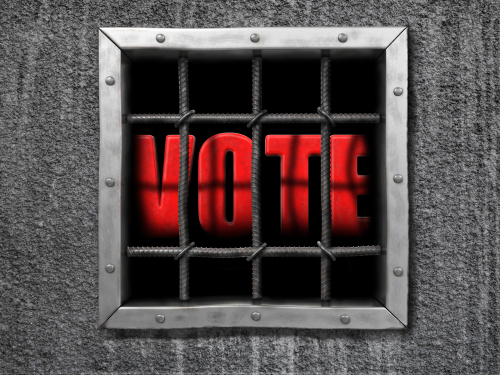Ban on lifetime voting for some felons violates Eighth Amendment, 5th Circuit rules

In a 2-1 Aug. 4 opinion, the 5th U.S. Circuit Court of Appeals at New Orleans struck down a provision of the Mississippi Constitution known as Section 241. Image from Shutterstock.
Mississippi’s lifetime ban on voting for felons convicted of some crimes serves no legitimate penological purpose and violates their rights under the Eighth Amendment, a federal appeals court has ruled.
In a 2-1 Aug. 4 opinion, the 5th U.S. Circuit Court of Appeals at New Orleans struck down a provision of the Mississippi Constitution known as Section 241. The provision, with current amendments, mandates lifetime disenfranchisement for people convicted of “murder, rape, bribery, theft, arson, obtaining money or goods under false pretense, perjury, forgery, embezzlement or bigamy.”
The appeals court said Mississippi should be barred from enforcing Section 241 against six plaintiffs who had completed their sentences and a class of similarly situated people.
The Mississippi Constitution as enacted in 1890 had a goal “to ensure the political supremacy of the white race,” the appeals court said. Section 241 targeted crimes thought to more often be committed by Black men, according to the 5th Circuit.
The Mississippi Constitution created a “safety net” by allowing restoration of voting rights for any person with a two-thirds vote of both houses of the legislature. That provision could have been used to benefit white people who were disenfranchised, the appeals court said.
The appeals court cited a “national consensus” against permanent disenfranchisement, suggesting that the Mississippi ban “is at odds with society’s evolving standards of decency.” Currently, 35 states and Washington, D.C., do not permanently ban voting by felons. Another four states only allow permanent disenfranchisement for corrupt practices in elections or governance.
“Mississippi stands as an outlier among its sister states, bucking a clear and consistent trend in our nation against permanent disenfranchisement,” the appeals court said in an opinion by Judge James L. Dennis, an appointee of former President Bill Clinton.
“By severing former offenders from the body politic forever, Section 241 ensures that they will never be fully rehabilitated, continues to punish them beyond the term their culpability requires, and serves no protective function to society. It is thus a cruel and unusual punishment,” the appeals court said.
The 5th Circuit rejected an argument that Section 241 violates the 14th Amendment’s equal protection clause, citing U.S. Supreme Court precedent from 1974. The appeals court noted, however, that the number of states permanently banning felons from voting has declined since 1974.
Judge Edith H. Jones, an appointee of former President Ronald Reagan, dissented. In the 1974 case, Jones said, the Supreme Court said parties challenging disenfranchisement should seek change through the legislature.
“Today, the court turns that advice on its head,” Jones wrote. “No need to change the law through a laborious political process. The court will do it for you.”
A different 5th Circuit panel ruled in a separate case in August 2022 that Section 241 does not violate the equal protection clause. The Supreme Court declined to hear that case June 30. Justices Sonia Sotomayor and Ketanji Brown Jackson dissented from the cert denial.
David Lat, founder of Above the Law, noted the latest decision at Original Jurisdiction.
Jones “filed a vigorous dissent, so don’t be shocked if this case winds up going en banc,” he wrote.
“Did I mention this is the 5th Circuit?” wrote Lat in a reference to the appeals court’s conservative reputation.
The case is Hopkins v. Hosemann.
Hat tip to How Appealing, which linked to the opinion and news coverage of the case.



